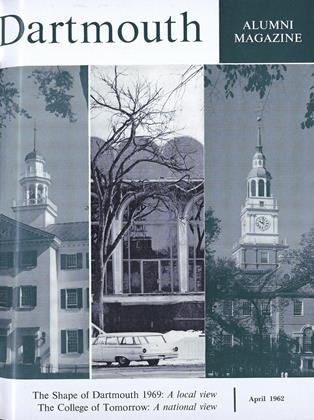By John Hall.Edited by Russell A. Fraser '47. NewBrunswick: Rutgers University Press, 1961.424 pp. $9.00.
The dust jacket of this excellently edited volume identifies Professor Fraser as "a graduate of Harvard and Associate Professor of English at Princeton University." Those who know Dartmouth will realize that the editor is acknowledging other academic antecedents when he dedicates his work "To John and Eleanor Hurd." And it is well for Dartmouth that it should not be denied some share of the credit for a fine work of scholarship.
The object of Professor Fraser's labors is John Hall, whose miscellany of religious verse, The Court of Virtue, was first (and last) published in 1565. Hall must have been among the first of the evangelically minded Protestants to decide that the devil should not have all of the good tunes. Sometimes he provides us with the melodies to which he wants his godly lyrics sung, and in other cases he indicates the tune he had in mind by quotation: "Sing this as, The dawnyng daye beginnes to glare, etc." One of Hall's obvious purposes, indeed, is to beat the devil at his own game by adapting the courtly love songs of such men as Sir Thomas Wyatt to the service of religion and of a Puritan religion at that. He failed in his worthy enterprise for one simple reason. He was a bad poet. "His skill in versifying was not admirable," as Professor Fraser puts it in his introduction.
It is not primarily to Hall the poet that Professor Fraser has devoted the skill and erudition that have gone into this volume however. It is rather to Hall, the man of his time. Hall, good puritan that he was, expended a great deal of energy in attacking the frailties of his sinful contemporaries. In order to deplore abuses properly one has to describe them, and thus, before he is done, Hall has treated us to discussions of, among other things, witchcraft and women's costume, astronomy and monstrous births, botany and the sweating plague of 1552. As a result, his book becomes what its editor calls it, "a student's vade mecum to the world of the Tudors." Or rather, it becomes that when we have been guided through it by Professor Fraser, for it is his learning that gives this volume its undoubted value to the student of England in the sixteenth century.
 View Full Issue
View Full Issue
More From This Issue
-
 Feature
FeatureTHE SHAPE OF DARTMOUTH 1969
April 1962 By C.E.W -
 Feature
FeatureMost Exciting Place on Campus
April 1962 By JOHN R. SCOTFORD JR. '38, -
 Feature
FeatureWho will pay—and how?
April 1962 -
 Feature
FeatureTPC: MASTER PLANNER
April 1962 -
 Feature
FeatureWhat Role for the Alumni?
April 1962 By SIDNEY C. HAYWARD '26, -
 Feature
FeatureDartmouth's Ongoing Purpose
April 1962
ROBERT G. HUNTER
Books
-
 Books
BooksTHE NEW ARGONAUTICA
December, 1928 -
 Books
BooksFaculty Publications
-
 Books
BooksTHE CABLE CAR IN AMERICA: A NEW TREATISE UPON CABLE OR ROPE TRACTION AS APPLIED TO THE WORKING OF STREET AND OTHER RAILWAYS.
APRIL 1973 By EDGAR T. M EAD -
 Books
BooksOPTICS: AN INTRODUCTION FOR OPHTHALMOLOGISTS.
May 1961 By GORDON H. GLIDDON -
 Books
BooksSOME ODES OF PINDAR
March 1943 By Roy H. Lanphear'25. -
 Books
BooksTHE ROAD TO RENO.
June 1962 By W. R. WATERMAN


